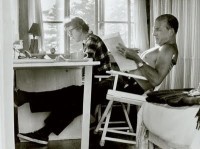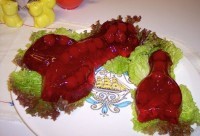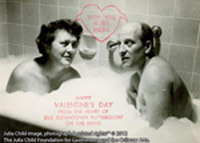
Note: Our accounts contain the personal recollections and opinions of the individual interviewed. The views expressed should not be considered official statements of the U.S. government or the Association for Diplomatic Studies and Training. ADST conducts oral history interviews with retired U.S. diplomats, and uses their accounts to form narratives around specific events or concepts, in order to further the study of American diplomatic history and provide the historical perspective of those directly involved.
Julia Child, who would have celebrated her 100th birthday on August 15, 2012, was a pioneer in bringing French cuisine to Americans at a time when most people were content with white bread and TV dinners. But before she rose to prominence, she had served in the OSS during World War II and experienced the life of a Foreign Service spouse when she married Paul Child, who served in the U.S. Information Agency (USIA).
Below are excerpts from a brief 1991 oral history with ADST in which she discusses her love of French cuisine and the ugly shadow of McCarthyism.
You can read the rest of this account on ADST.org CHILD: When I was in the Foreign Service, they didn't really pay attention to wives at all. A lot of them never learned the language, or did anything....We were in World War II, we were in the OSS [Office of Strategic Services] and we met in Ceylon, or Sri Lanka, it was Ceylon then. Then we went up to China and we were there when the bomb dropped. Then we came back to Washington and Paul's OSS Department -- they called it visual presentation, maps, diagrams, war rooms and things like that -- became the U.S. Information Agency. Paul had spent a lot of his young manhood in France and spoke beautiful French, really practically bilingual.
CHILD: When I was in the Foreign Service, they didn't really pay attention to wives at all. A lot of them never learned the language, or did anything....We were in World War II, we were in the OSS [Office of Strategic Services] and we met in Ceylon, or Sri Lanka, it was Ceylon then. Then we went up to China and we were there when the bomb dropped. Then we came back to Washington and Paul's OSS Department -- they called it visual presentation, maps, diagrams, war rooms and things like that -- became the U.S. Information Agency. Paul had spent a lot of his young manhood in France and spoke beautiful French, really practically bilingual.
When they were setting up the USIS [United States Information Service] in Paris, he was asked to go over, which was of course wonderful for us.
And then, I had never had French food before. And I just fell in love with French food from the first bite. We came over, I think it was on the SS America with our old blue Buick, and our first French meal, or my French meal was in Rouen and I never, never turned back after that.
After we had gotten settled, I enrolled in the Cordon Bleu [the French cooking school originally founded to give orphans a profession] and I was fortunately able to join a group of GIs on the [GI] Bill of Rights and we had a wonderful old chef [Max Bugnard] who had trained under Escoffier and was a real classicist and a wonderful man. We would start at seven in the morning and cook until about eleven. Then I would rush home and cook Paul a fancy lunch and go back again.
Q: And you were the only woman in the class?CHILD: I was the only woman in that class with the men. I just became passionate, I had been looking for a career all my life. I wanted to be on the New Yorker or something like that. Well, this was it. I was passionately interested in it, the tremendous care that all the chefs and teachers took. It was art for art's sake. It made no difference how long it took. If it came out beautifully, that was it. That was very appealing.
Luckily at that time I had met my French colleague, Simone Beck. There wasn't anyone to talk to of my own type. We had mutual friends who introduced me to Simca, as she was known, and Jean at a cocktail party and we literally embraced each other immediately because she felt the same way about, "Whom can I talk to!" She had a colleague, Louisette Bertholle, and the two of them were working together on a book on French cooking for Americans.
So we started our cooking school about the next day and we called it the École des Trois Gourmandes, the School of the Three Hearty Eaters. That really started us seriously. Then their collaborator died, and that pleased me very much. I never knew him. Good timing.
So we started in on our book together, and that took a long gestation period. It wasn't done until our last post in Norway, which was in '59. When we got to Oslo there was an American Women's Club and I remember the first luncheon I went to, which would have been in probably '59. It was a typical ladies' luncheon. They had a salad made out of Jell-O, I guess, and it had bananas and grapes and marshmallows and it was shaped -- and really it looked like a phallic symbol! It was sitting on a little piece of lettuce, you couldn't hide it under anything. Then it ended with one of those cake mix cakes with a white mountain of coconut frosting. Horrible! And some of us got together and said, "Never again!" So we had a cooking committee so we couldn't end up with anything like that again.
They had a salad made out of Jell-O, I guess, and it had bananas and grapes and marshmallows and it was shaped -- and really it looked like a phallic symbol! It was sitting on a little piece of lettuce, you couldn't hide it under anything. Then it ended with one of those cake mix cakes with a white mountain of coconut frosting. Horrible! And some of us got together and said, "Never again!" So we had a cooking committee so we couldn't end up with anything like that again.
I gave cooking lessons there in Norway with a mixed -- Norway was an awfully nice post. Oslo, we just loved it. After Norway, Paul had said that when he was sixty, he was going to retire because he never really liked the bureaucracy at all. And so we left when he was sixty, and that's when my book [Mastering the Art of French Cooking] came out. And he helped me with all of that. He helped me with proof reading and the index. He's a wonderful photographer, so he did photographs from which we had a sketch artist do drawings. So it was wonderful having him.
Q: He was very supportive, wasn't he?CHILD: Oh, very, in everything. He was a prime dishwasher and baggage carrier. And then he was good intellectually for me, for I was rather messy intellectually. But he would always talk about the operational proof, and things like that. We had a very good time together....
Q: And also, to be able to go from your lessons to all of the delightful little restaurants around Paris.
CHILD: Yes, and what was wonderful. Those were the days of the classic cuisine, and it was so good. It was delicious. Just a plain roast chicken was so good. That was before they had learned to do battery raised chicken. They really tasted like chicken. And delicious vegetables and salads and cheeses, and so forth.
Q: While you were learning at class, you must have gone to little restaurants.
CHILD: Oh, in the old days, I think Paul's salary was $6,000 and I got $100 a month from my family. But we had envelopes, and we each had $2 a week allowance, and we had everything budgeted out and we very carefully saved everything for going out. But even so we could go out two or three times a week, and even a great restaurant like the Grand Véfour was only about $3.50. Or was it $10? I think maybe it was $10. But you could eat beautifully for a reasonable price. But we had to watch every penny.
CHILD: During the McCarthy thing we were in Marseilles, and when [Roy] Cohn and [David] Schine [reference to an infamous European trip made by McCarthy's two bullying assistants] came through, I think we were still there. We went up to Paris shortly afterwards. They [Cohn and Schine] had arrived in Paris and of course they went out to all the nightclubs and so forth, and it happened to be during Easter, and on Easter Sunday they had called a meeting that everyone was to get there at eight o'clock a.m. at the USIS office.
Of course, they didn't appear. It turned out that when they finally got hold of them, they were sleeping off a night at Montmartre. They had ruined everyone's weekend. I remember they were charging though the USIS and [cultural attaché] Larry Morris came in and saw Cohn sitting at his desk with his feet on his desk. Larry Morris said, "Get out of that chair. Get your feet off my desk." But most people were scared to do anything. They were also the kind of people that if you really came at them, they would back right off. But most people didn't dare. I remember Allen Dulles [Director of the Central Intelligence Agency in the early 1950s], as I was told, when they wanted to investigate the CIA, he said, "If you are going to investigate anyone, you can investigate me." They never touched him.
But if you cringed, they were right on top of you. I never met them myself. There were also the people who just cravenly fell down in front of them. And we had quite a number of people who were just ruined by them. John Carter Vincent [Minister to Switzerland (1947-51] was one of the China Hands drummed out of the Foreign Service by McCarthy's tactics. Vincent and others were accused of "losing China" to the Chinese communists led by Mao Tse-tung. It was horrible what they did to him.... Q: Well, maybe one post there, who knows. Your husband sounds like a very interesting man.CHILD: Black belt in judo, and photographer and painter. He was not a bureaucratic man. What he liked to do was have his work and do it. And he was never ambitious. I know there were some of them in the Paris embassy who would go in on Sundays and Saturdays, busy work, so people could see they were there. Paul left as soon as he could leave, and did his work, and he just didn't get into the politics of the bureaucracy at all, so he never rose very far.
Q: Well, maybe one post there, who knows. Your husband sounds like a very interesting man.CHILD: Black belt in judo, and photographer and painter. He was not a bureaucratic man. What he liked to do was have his work and do it. And he was never ambitious. I know there were some of them in the Paris embassy who would go in on Sundays and Saturdays, busy work, so people could see they were there. Paul left as soon as he could leave, and did his work, and he just didn't get into the politics of the bureaucracy at all, so he never rose very far.
